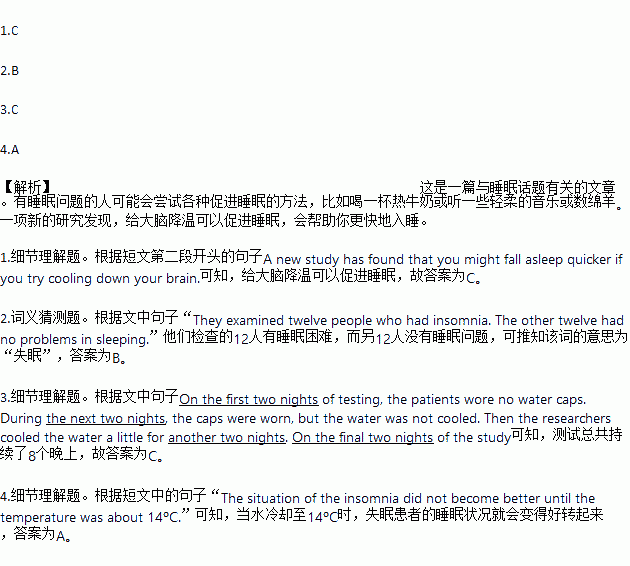题目内容
Are you having a problem going to sleep? Have you tried many ways such as drinking a glass of warm milk or listening to some soft music or counting sheep but it still does not work? Cooling down your brain may be a great way to help you get good sleep.
A new study has found that you might fall asleep quicker if you try cooling down your brain. Daniel and Eric from the University of Pittsburgh Medical School led the study. They examined twelve people who had insomnia. The other twelve had no problems in sleeping. Each of them wore a cap on their heads at bed time.
The caps had tubes (管) inside filled with water. The researchers moved the water through the tubes and then changed the temperature of the water. People had trouble sleeping (called “patients” in the following parts of the passage) often had more chemical reactions (化学反应) in their brains. The researchers thought lowering the temperature of the head might help.
On the first two nights of testing, the patients wore no water caps. During the next two nights, the caps were worn, but the water was not cooled. Then the researchers cooled the water a little for another two nights. On the final two nights of the study, the temperature of the water was made much cooler.
The situation of the insomnia did not become better until the temperature was about 14ºC. Most of the patients fell asleep faster and slept better when the coolest water was moving around their heads.
This is the only beginning of the head temperature study. But they believe they have discovered something important that needs more research.
1.A new study to help people fall asleep quicker is _________.
A. counting sheep B. listening to soft music
C. cooling down your brain D. drinking a glass of warm milk
2.What’s the meaning of the underlined word “insomnia”?
A. 抑郁症. B. 失眠症. C. 自闭症. D. 头痛.
3.According to the passage, the test lasts for _________ nights.
A. 12 B. 10 C. 8 D. 6
4.Insomnia patients became better when _________.
A. the water was cooled about 14ºC B. The caps were filled with water
C. the water was not cooled D. the water caps were worn on their heads

